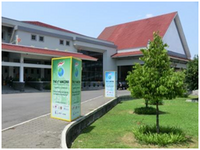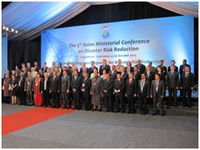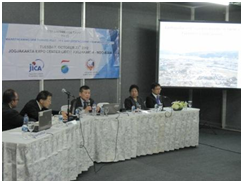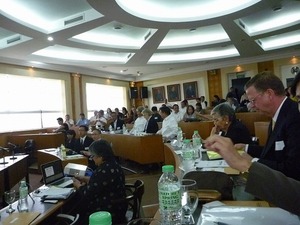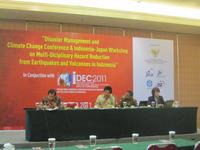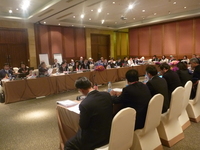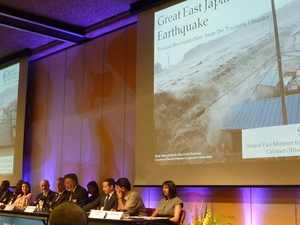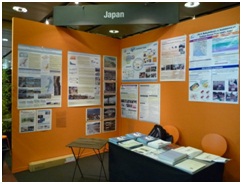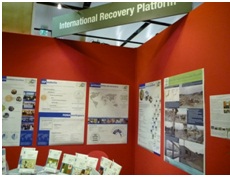Activity Report: >> Themes & Issues
23-25 October 2013 (Beirut, Lebanon)
The Government of Lebanon has recently adopted a National Response Framework (NRF) for Disaster. In view of this, the Government had requested IRP/ADRC to expand the Framework by integrating a Disaster Recovery Framework. In collaboration with UNDP Lebanon, IRP/ADRC facilitated a workshop on disaster recovery planning held at Grand Serail in Beirut Lebanon on 23-25 October 2013. The organization of the workshop was supported under the EC-funded project "Strengthening Region-based Capacities in Disaster Recovery Planning", which is being implemented by UNISDR through IRP/ADRC
About 25 high-level officials from different ministries of the Government of Lebanon participated in the workshop to explor options of recovery from disasters and conflicts. Additionally, representatives of international rganizations, specifically WHO and UNDP also participated to make sure that the workshop encapsulates local knowledge and regional experience. At the opening, several dignitaries delivered relevant messages. These included Gen. Mohamed Kheir, Secretary General of High Council of Defense of the Government of Lebanon; Mr. Shombi Sharp, Deputy Country Director of UNDP in Lebanon; and Ms. una Abu Sweireh, Program Manager of UNISDR Office in Bonn, Germany.
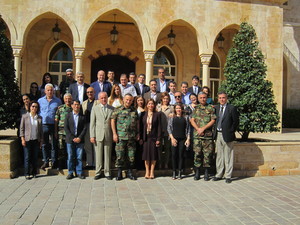
Various aspects of recovery planning were discussed in this workshop. In particular, strategies and actions to "build back better" after disaster and conflict were explored using ocal and global cases as reference. The lessons on recovery, as compiled by IRP/ADRC from different experiences around the globe provided additional input to build on the existing government initiatives. The key output of the workshops is the consolidated strategic recommendations for recovery framework for disaster and conflict.
As way forward, all participants will be included in the Roster of Experts maintained by IRP/ADRC. Trained experts will continually receive information and update on recovery. Moreover, trained experts are expected to share knowledge gained from the workshops to other officials from different government ministries.
(2013/11/11 14:40)
15-17 October 2013 (Makati City)
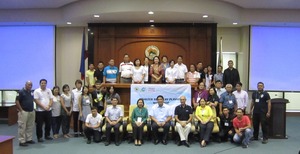
The Makati City Government requested IRP/ADRC to facilitate the city's initiative of developing a Disaster Recovery Framework through a workshop held on 15-17 October 2013 at the City Hall Conference Room, Makati City, Philippines. Since Makati is the location of central business, the mayor wants to ensure that Business Continuity Plans (amongst others) are put in place and specified in the City Recovery Framework.
About 50 city officials from different departments participated in the workshop to explore strategies and actions on recovery. In addition, officials from other local governments of Metro Manila also participated to make sure that local knowledge and experiences within the Metropolis are shared. The General Manager of the Metro Manila Development Authority (MMDA) was also present at the workshop. During this event, the participants were exposed to various options to "build back better" after a disaster. A wide array of strategies and actions from the Guidance Notes on Recovery serve as options for the city to adopt, if suited to its context. The lessons on recovery, as compiled by IRP/ADRC from various experiences around the globe, provided an additional input to build on the existing initiatives. The key output of the workshop is a draft Recovery Framework of Makati City.
As a way forward, the Makati Government formed a Working Group on Disaster Recovery Framework to fine-tune the output from the workshop. The draft will be shared to other departments for comments and suggestions. The working group will then incorporate the comments, and revise the draft. The final version of the Framework will be submitted to the City Council for discussion and adoption by the City Government in December 2013. Once adopted, sources of funds will be identified for its implementation.
(2013/11/11 14:40)
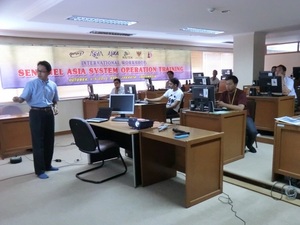
21-22 March, 2012 (Bangkok Thailand)
The Workshop on Use of Multi-Global Navigation Satellite Systems for Sustainable Development organized by UNESCAP and supported by JAXA, was held in Bangkok, Thailand from 21 to 22 March 2012.
Government officials and experts from 13
countries and intergovernmental organizations participated in the workshop and
discussed potential utilization of Multi-Global Navigation Satellite Systems
(Multi-GNSS) in the fields of transportation, disaster risk reduction and
agriculture.
http://www.unescap.org/idd/events/2012-Workshop-Multi-GNSS-21-22-Mar-2012/index.asp
(2012/3/23
11:30)
19th and 20th March, 2012 (India, Vanarasi)
International Seminar on "Disaster and
Environmental Management" was held by Institute of
Management Studies, Mahatoma Gandhi Kashi Vidyapith University from 19-20 March
2012 in Vanarasi, India.
The ADRC made a presentation about the
current situation of recovery and reconstruction on Great East Japan Earthquake
and Tsunami in the Technical Session "Institutional and policy Framework for
Disaster Management."
About 100 researchers, experts and students
participated in the seminar and actively exchanged views and opinions on the
issue of disaster and environmental mangement.
(2012/3/21
11:30)
12 March 2012 (Seoul, Korea)
The ADRC participated in the International Conference on "Lessons from Japan: Is Japan Korea's Future?" held on 12 March 2012 jointly organized by Asian Development Bank Institute and North East Asian Research(NEAR) Foundation of Korea Rep.
ADRC made presentation regarding the
current situation of recovery, reconstruction and lessons on the Great East
Japan Earthquake and Tsunami disaster.
Around 100 participants attended the
conference including experts and officials from nuclear, disaster management,
economics and security fields and actively exchanged views and opinions on the
broad issues such as aging society, social welfare, disaster risk management,
nuclear power plant and security.
http://www.adbi.org/event/5010.adbi.near.conference.japan.korea.future/
(2012/3/13 11:30)
8-9 March 2012 (Tokyo, Japan)
Seminar on Disaster Risk Management in Asia: Lessons and Challenges was held by Asian Developing Bank Institute from 8 to 9 March 2012 in Tokyo, Japan. The ADRC explained the importance of business continuity plan (BCP) in the private sector for the regional resilience and the current situation of the private sector in the APEC region based on the research made by ADRC.
About 100 officials, experts from public and private organizations participated in the seminar and actively exchanged views and opinions among them, demonstrating their strong interests in disaster risk management measures both structural and non-structural.
http://www.adbi.org/event/5012.disaster.risk.management.asia/
http://www.adbi.org/event/5013.disaster.risk.management.brainstorming.meeting/
(2012/3/9 11:30)
14-16 February 2012 (Kuala Lumpur, Malaysia)
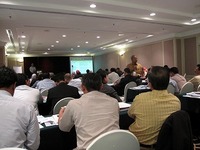
From 14 to 16 February 2012, Asian Disaster Reduction Center (ADRC) conducted workshop on DRM in Kuala Lumpur, Malaysia targeting local government officials. Malaysia's National Security Council (NSC) and ADRC have been prepared for this training since 2009. Some 80 local officials in charge of DRM nationwide as well as NSC and line departments attended the workshop.
The officials from NSC, Malaysian Meteorological Department (MMD) and relevant agencies gave lectures in this training, followed by Training of Trainers in 2010. The attending local officials, who are expected to play a pivotal role in community-based disaster risk management (CBDRM), learned topics such as NSC Directive, flood management, early warning and recovery efforts from tsunami in Malaysia and Japan and had group discussion on CBDRM. The training program drew a lot of interest from the participants and invited active discussion.
The workshop put an end to the training program in Malaysia but it is hoped that capacity building activities of local officials and communities will extend leading to further strengthen disaster resilience of the country.
(2012/2/27 17:40)


Since 2009, ADRC has initiated a pilot project of DR Policy Peer Review with the aim of developing DRR capacity of ADRC member countries by sharing information and strengthening the relationship among member countries. This year Tajikistan was selected as target country for the review project of the third year. After the submission of country report, reviewer team had visited target countries to conduct interview surveys.
The ADRC reviewer team, composed of Prof. Hiroshi Fukuoka (Associate Professor, Research Center on Landslides Disaster Prevention Research Institute, Kyoto University), Dr. Tai-Hoon Kim (Analyst, National Disaster Management Institute, Ministry of Public Administration and Security, Republic of Korea), Mr. R.M.S. Bandara (Head, Landslide Studies & Services Division, National Building Research Organisation, Ministry of Disaster Management, Sri Lanka) and Ms. Miki Kodama, senior researcher of the ADRC visited Dushanbe, Tajikistan. The team visited various ministries and institutions involving in landslide DRR activities, including Committee of Emergency Situation (ADRC's counterpart in Tajikistan), to examine how they have been making the efforts for reducing landslide disasters by government and non-governmental organizations in Tajikistan. Then, the team conducted field survey at the affected area by the 2009 large-scale landslide disaster in Khuroson district, and prepared a draft report of the survey result with all findings and recommendations. A workshop was held for getting opinion and comments to finalize the report as well as introducing good practices for landslide DRR in Japan, Republic of Korea, and Sri Lanka. It provided a very good opportunity for exchanging opinions each other.
This project aims at developing the mutual learning process among the ADRC member countries instead of one-way learning. After the survey missions, reviewer teams will compile survey reports and send them to target countries and then to ADRC member countries to enhance cross-fertilization.
ADRC would like to express its sincerest gratitude to all of those who have made precious contribution to this project this year.
13-14 December 2011 (Brunei)
ADRC has been implementing web-based GLIDE-associated disaster database development project in ASEAN countries since 2008 with the financial support by Japan ASEAN Integration Fund. The objective of this project is to facilitate all ASEAN countries to develop their own national disaster databases with GLIDE numbers incorporated by training government officials in charge of disaster information in ASEAN countries.
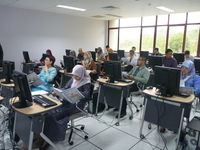
ADRC held operator training for both GLIDE and DesInventar with kind support from National Disaster Management Center (NCDM) and UNISDR at Brunei University.
About 25 government officials from related departments participated in the training and actively exchanged views and opinions for future enhancement of the systems in Brunei.
(2011/12/14 11:30)
6 December 2011 (Thailand)
Asian Disaster Reduction Center started consultation with relevant orgnizations to explore possible and appropriate cooperation activities in recovery process from the devastating floods in Thailand. Please refer to the ADRC Highlights Vol. 225 at http://www.adrc.asia/highlights/NewsNo225.
(2011/12/06 13:10)
10 November 2011 (Incheon, Korea)
The ADRC was invited to the International Conference on Disaster Risk Reduction Legislation and Policy as part of the Asian Forum of Legislative Information Affairs (AFOLIA). The Conference was organized by the Ministry of Government Legislation in cooperation with the National emergency Management Agency.
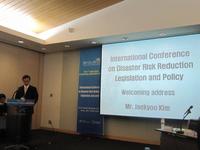 Specifically, the ADRC made a presentation on "Disaster risk reduction legislation and policy in Japan" at Part I "Disaster risk reduction legislation and policy in Korea, China and Japan and cooperative measures" of the Conference. Other participants include representatives from Chinese government, UN and various organizations and universities The Forum was the first of its kind organized by the Ministry of Government Legislation and encompassed many areas, not only disaster risk reduction but many other fields as well. It manifested a strong initiative being taken by Korean Government within Asia.
Specifically, the ADRC made a presentation on "Disaster risk reduction legislation and policy in Japan" at Part I "Disaster risk reduction legislation and policy in Korea, China and Japan and cooperative measures" of the Conference. Other participants include representatives from Chinese government, UN and various organizations and universities The Forum was the first of its kind organized by the Ministry of Government Legislation and encompassed many areas, not only disaster risk reduction but many other fields as well. It manifested a strong initiative being taken by Korean Government within Asia.
While an interest in a post HFA (Hyogo Framework for Action) 2005-2015 and a need to establish international disaster response laws (IDRL) were growing, discussion on disaster legislations at the Conference was indeed significant and meaning attempt.
(2011/11/12 13:10)
7-8 November 2011 (Taipei, Taiwan)
The 2011 International Workshop on Emergency Management was organized by the Ministry of Interior, Government of Taiwan from 7 to 8 November 2011 in Taipei city.
Ten government officials and specialists on Disaster Emergency Management, including a ADRC's researcher, were invited to the workshop to make presentations and speeches. The ADRC explained the importance of business continuity plan (BCP) in the private sector for the regional resilience while other speakers presented case study on the response and recovery phase of large scale disasters both man-made and natural.
About 200 officials, experts participated in the workshop and actively exchanged views and opinions among them, demonstrating their strong interests in disaster risk management.
(2011/11/09 11:30)
31 October -1 November (Jakarta, Indonesia)
This two-day symposium was organized jointly by Government of Indonesia, the Economic Research Institute for ASEAN and East Asia (ERIA) and Harvard University. Under the main theme of "Moving ASEAN Community Forward into 2015 and Beyond", the symposium discussed various issues on the fulfillment of the ASEAN Economic Community that is due on 2015 and the future challenges beyond the date.
Among three substantive sessions organized, the ADRC participated in 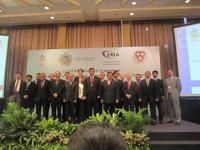 the Session 2: Moving the ASEAN Community Forward through Strengthening of Regional Corporation: Engendering a Resilient and Harmonious ASEAN whereby making a presentation "Strengthening regional cooperation in times of disaster".
the Session 2: Moving the ASEAN Community Forward through Strengthening of Regional Corporation: Engendering a Resilient and Harmonious ASEAN whereby making a presentation "Strengthening regional cooperation in times of disaster".
In the outcome document titled"Jakarta Framework on Moving ASEAN Community Forward into 2015 and Beyond", it is mentioned that "the issues of resiliency, especially food security and energy security, as well as disaster management, have been identified as important challenges to be tackled" and "ASEAN's increasing demand for food and energy is even more challenging given the risks of natural disasters, for the fact that Asia is the most disaster prone region in the world."
(2011/11/02 13:10)
27 October 2011 (Jakarta, Indonesia)
The Conference "Disaster Management and the Impact of Climate Change" was organized by the Coordinating Ministry for People's Welfare, Republic of Indonesia as part of "The Indonesian Disaster Preparedness, Response and Recovery, EXPO and Conference (IDEC)2011.
It was jointly organized by the JST-JICA Project "Multi-disciplinary Hazard Reduction from Earthquakes and Volcanoes in Indonesia. 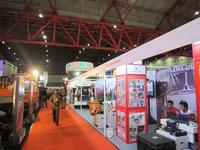 Hence, members of the JST-JICA Project participated in the Conference, Specifically, three members made presentations, focusing on recent disasters in Indonesia and in Japan, which included the presentation "Policy Response to 3.11 Earthquake and Tsunami Disaster" done by Mr. Atsushi Koresawa of the Center.
Hence, members of the JST-JICA Project participated in the Conference, Specifically, three members made presentations, focusing on recent disasters in Indonesia and in Japan, which included the presentation "Policy Response to 3.11 Earthquake and Tsunami Disaster" done by Mr. Atsushi Koresawa of the Center.
The joint coordination of the Conference demonstrated the importance and relevance of the activities that the JST-JICA Project were engaged in.
(2011/10/28 13:10)
18 October -21 October 2011 (Beijing, China)
ADRC participated in the Seminar on East-Asia Earthquakes Studies - Earthquakes, Tsunamis and Volcanoes in Northeast Asia: International Collaboration and Regional Capacity Building for the Forecast, Preparedness and Early Warning.
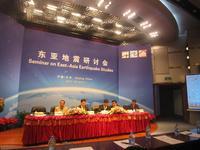 The Seminar was organized jointly by the China Earthquake Administration (CEA), the Japan Meteorological Agency (JMA), and the Korea Meteorological Administration (KMA). It was a first attempt of this kind.
The Seminar was organized jointly by the China Earthquake Administration (CEA), the Japan Meteorological Agency (JMA), and the Korea Meteorological Administration (KMA). It was a first attempt of this kind.
The Seminar addressed key scientific and technological issues in need of special consideration for forecast, preparedness and early-warning of earthquakes, volcanoes and tsunamis, especially for Northeast Asia. Experts from not only China, Korea and Japan but also from other countries in Asia and other regions participated and examined relevant issues based on their experiences, most notably the 2008 Wenchuan Earthquake in China and the 2011 Great East Japan Earthquake and Tsunami.. Mr. Atsushi Koresawa of the ADRC presented "Policy Response to Great East Japan Earthquake" in the "Communicating with the Public" session.
The Seminar was successfully closed by reaching a consensus that collaborate need to be continued and strengthened among China, Korea and Japan and with other countries in Asia to further enhance scientific knowledge and relevant technologies against seismic hazards.
(2011/10/22 13:10)
29 August -1 September 2011 Honai, Hue and Ho Chi Minh City, Vietnam
As part of an ongoing study on the use of ICT for disaster preparedness and response in ASEAN countries, ADRC has recently visited Hanoi, Hue and Ho Chi Minh City in Vietnam to interview experts at various government's institutions, including Vietnam Ministry of Agriculture and Rural Department and Ministry of Natural Resources and Environment, and collect information relevant to this subject.
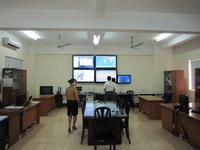 The use of ICT for disaster preparedness and response has been making a steady progress in Vietnam, in particular weather forecasting and monitoring, risk assessment and risk mapping, early warning to communities and people, etc. Moreover, state-of-art ICT technologies have been widely applied such as broadband networking of observation stations and automatic communication by mobile phone, but mostly on an experimental basis.
The use of ICT for disaster preparedness and response has been making a steady progress in Vietnam, in particular weather forecasting and monitoring, risk assessment and risk mapping, early warning to communities and people, etc. Moreover, state-of-art ICT technologies have been widely applied such as broadband networking of observation stations and automatic communication by mobile phone, but mostly on an experimental basis.
While good progress has been made for typical meteorological and hydrological hazards such as typhoon and flooding, relatively less progress has been made for landslide, flash flood, and geological hazards such as earthquake and tsunami. Among them, tsunami warning system (towers) has recently been developed in Da Nang city in Central Vietnam, but more has to be done in view of future tsunami risks in its long coastal line. Likewise, disaster preparedness and response capacity could be further enhanced if it would make more use of such ICT technologies as information sharing system among various institutions, remote sensing, imaging system, real-time measurement sensor, etc.
The result of the study will be used as a basis on which further cooperation is planned. We appreciate greatly kind cooperation extended by the Disaster Management Center (DMC) of the Ministry of Agriculture and Rural Development.
(2011/9/2 13:10)
27-29 June 2011 (Bangkok, Thailand)
The Expert Group Meeting on Regional Knowledge and Cooperation for Comprehensive Multi-Hazard risk Management in Asia and the Pacific was organized by the United National Economic and Social Commission for Asia and the Pacific (ESCAP) from 27 to 29 June 2011 at the United national Conference Centre in Bangkok, Thailand. The Meeting was attended by experts from many countries as well as experts from intergovernmental and international organizations. Invited by the ESCAP, ADRC also participated in the Meeting.
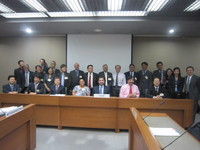 The Meeting addressed: a) Asia Pacific Gateway on Disaster Risk Reduction and Development; b) Data for Disaster Risk Reduction and Assessment; c) Regional Cooperative Mechanism on Disaster Monitoring and Early Warning, Particularly Drought, and; d) Asia Pacific Disaster Report. Experts discussed in details relevant issues and needs and necessary actions. ADRC stressed the importance of compilation of disaster data, the used of GLIDE (Global Unique Disaster Identifier), sharing of experiences and lessons regarding to specific disasters such as the March 11 Great East Japan Earthquake and tsunami.
The Meeting addressed: a) Asia Pacific Gateway on Disaster Risk Reduction and Development; b) Data for Disaster Risk Reduction and Assessment; c) Regional Cooperative Mechanism on Disaster Monitoring and Early Warning, Particularly Drought, and; d) Asia Pacific Disaster Report. Experts discussed in details relevant issues and needs and necessary actions. ADRC stressed the importance of compilation of disaster data, the used of GLIDE (Global Unique Disaster Identifier), sharing of experiences and lessons regarding to specific disasters such as the March 11 Great East Japan Earthquake and tsunami.
Following the above Expert Group Meeting, the UNESCAP Committee was convened from 29 June to 1 July and ADRC also participated in the Committee meeting as an observer. During discussion, a number of countries made mention about ADRC as being relevant to regional cooperation for disaster risk reduction. By showing gratitude to continued cooperation with those countries, ADRC expressed wish to continue to cooperate with them through its activities.
(2011/07/04 13:10)
The Third Session of the Global Platform for Disaster Risk Reduction (DRR) organized by UNISDR was held from 8 to 13 May 2011 in Geneva, Switzerland to discuss topics around the theme "Invest Today for a Safer Tomorrow: Increased Investment in Local Action." The Global Platform also included the first World Reconstruction Conference (WRC), hosted by the World Bank.
ADRC participated in several side events, including "Saving Lives and Improved Coastal Risk Management through Regional Cooperation in Ocean and Marine-Related Early Warning Systems in Asia" and "Integrated Use of Space Technologies for Disaster Risk Reduction". In the latter, ADRC presented the use of emergency satellite observations through the Sentinel Asia Initiative and explained how space-based applications were effectively used during the Great Eastern Japan Earthquake. Together with the Japanese government, ADRC also took advantage of the DRR Market Place area to highlight several recent projects on disaster preparedness, response, and recovery by displaying relevant posters. One of the posters showed the impacts of the Great Eastern Japan Earthquake vis-à-vis preparedness and response measures.
On the other hand, IRP set up its own booth at the DRR Market Place to showcase knowledge products and services for resilient recovery. Several posters were displayed to communicate key messages for "Build Back Better". The Guidance Notes on Recovery and the Capacity Building Module on Resilient Recovery drew a lot of attention from participants. Moreover, IRP in cooperation with ADRC, made a presentation entitled "The Great East Japan Earthquake: Rethinking the Investment for Safer Tomorrow" at the Ignite Stage.
(2011/5/16 11:30)
7th March 2011 (Washington DC, USA)
The ADRC participated in the Emergency Preparedness Working Group organized by Asia Pacific Economic Cooperation in Washington DC.
The Working Group is co-chaired by Australia and Indonesia and around 40 participants attended the meeting included representatives from 16 member economies namely Australia, Brunei, Canada, Chili, Indonesia, Japan, South Korea, Malaysia, Papua New Guinea , Peru, Philippines, Singapore, Russia, Taiwan, USA and Vietnam.
The WG addressed issues related to minimize the economical impact of disruption caused by natural disasters. The ADRC introduced the emergency satellite observation framework of Sentinel Asia and Business Continuity Management methodology to minimize the economical impact for effective disaster response. (2011/03/08 11:30)
1-4 March 2011 (Islamabad, Pakistan)
The objective of this Workshop, which is organized jointly by UNESCAP, Pakistan Meteorological Department (PMD), Pakistan Space & Upper Atmosphere Research Commission (SUPARCO) at SUPARCO, Islamabad, Pakistan, is to develop the capacity to build better resilience to water related disasters as well as for more effective adaptation to climate change through the applications of space technology and flood risk management in Pakistan.
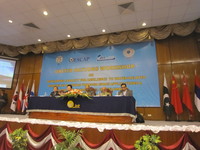 Space-based technologies increasingly play an important role in disaster risk management as demonstrated by floods in Pakistan and in Thailand. ADRC was invited as an expert by the organizers and made two presentations on "Enhancing the use of space-based technologies for disaster risk management" focusing on Sentinel Asia and "Community-based disaster risk management" respectively. Participants especially from Pakistan showed great interest in Sentinel Asia and other space-technology related programmes. Also, some participants underscored the importance of community-based disaster risk reduction activities in Pakistan. Space-technologies have been becoming more relevant to and useful for disaster risk management.
Space-based technologies increasingly play an important role in disaster risk management as demonstrated by floods in Pakistan and in Thailand. ADRC was invited as an expert by the organizers and made two presentations on "Enhancing the use of space-based technologies for disaster risk management" focusing on Sentinel Asia and "Community-based disaster risk management" respectively. Participants especially from Pakistan showed great interest in Sentinel Asia and other space-technology related programmes. Also, some participants underscored the importance of community-based disaster risk reduction activities in Pakistan. Space-technologies have been becoming more relevant to and useful for disaster risk management.
ADRC as a focal point for emergency observations of Sentinel Asia and a regional support office of UNSPIDER will continue to contribute to this objective.
(2011/03/04 13:10)
17-22 January 2011 (Jeju, Republic of Korea)
The ADRC participated in the 43rd Session of Typhoon Committee organizend by United Nations Economic and Social Commission for Asia and the Pacific(UNESCAP), the World Meteorological Organization(WMO) Typhoon Committee in Jeju
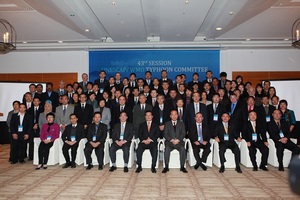 on 17-22 January 2011.
on 17-22 January 2011.
The 43rd Session was hosted by Republic of Korea and around 100 participants attended the meeting included representatives from China, Japan, Malaysia, Philippines, Republic of Indonesia, Republic of Korea, Singapore, Thailand, USA, Viet Nam, Hong Kong and Macao Special Administrative Regions, as well as representatives from the organizing institutions.
The Committee consists of three working groups, namely, WG on Meteorology(WGM), WG on Hydrology(WGH), and WG on Disaster Risk Reduction(WGDRR), among which ADRC has joined WGDRR.
The Committee as well as its WGs addressed issues related to the impact of climate change on tropical cyclone frequency and intensity, growing risks of urban flooding, among others. The ADRC gave a presentation on the recent activities introducing the framework of Sentinel Asia using GLIDE numbers for effective disaster response.
For more details, please refer to: http://typhooncommittee.org/session.htm
(2011/1/28 11:30)
5-10 December 2010 (Ulaanbaatar, Mongolia)
12-16 December 2010 (Dhaka and Noakhali, Bangladesh)
Since 2009, ADRC has initiated a pilot project of ADRC Peer Review with the aim of developing DRR capacity of ADRC member countries by sharing information and strengthening the relationship among member countries. This year Mongolia and Bangladesh were selected as target countries among applications from ADRC member countries. After the submission of country reports by the two target countries, reviewer teams, which consist of two officers from member countries, one expert from Japan and one or two from ADRC per a target country, have visited target countries to conduct interview surveys.
<Mongolia>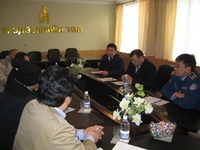 On 5-10 December 2010, the ADRC reviewer team, composed of Prof. Masato Motosaka (Earthquake Disaster Research Laboratory, Disaster Control Research Center, Graduate School of Engineering, Tohoku University), Mr. Tshering Kezang (Governor, Dzongkhag Administration, Lhuentse, Bhutan), Mr. Vizesh Rana (Deputy Commandant, Ministry of Home Affairs, India) and two ADRC staff members visited Ulaanbaatar, Mongolia. During the four day survey, the team visited various ministries and institutions related to DRR activities, including NEMA: National Emergency Management Agency (ADRC's counterpart in Mongolia), to examine how they have been making the efforts for earthquake disaster education and capacity development by government and non-governmental organizations in Mongolia. Then, the team conducted on-site review of the building condition, and prepared a draft report of the survey result with all findings and recommendations. On the last day of the survey, a workshop was held for getting opinion and comments to finalize the report and attended by about 30 NEMA officials. The representative from Bhutan and India also made presentations on their efforts for earthquake disaster reduction in the workshop. It provided a very good opportunity for exchanging opinions each other.
On 5-10 December 2010, the ADRC reviewer team, composed of Prof. Masato Motosaka (Earthquake Disaster Research Laboratory, Disaster Control Research Center, Graduate School of Engineering, Tohoku University), Mr. Tshering Kezang (Governor, Dzongkhag Administration, Lhuentse, Bhutan), Mr. Vizesh Rana (Deputy Commandant, Ministry of Home Affairs, India) and two ADRC staff members visited Ulaanbaatar, Mongolia. During the four day survey, the team visited various ministries and institutions related to DRR activities, including NEMA: National Emergency Management Agency (ADRC's counterpart in Mongolia), to examine how they have been making the efforts for earthquake disaster education and capacity development by government and non-governmental organizations in Mongolia. Then, the team conducted on-site review of the building condition, and prepared a draft report of the survey result with all findings and recommendations. On the last day of the survey, a workshop was held for getting opinion and comments to finalize the report and attended by about 30 NEMA officials. The representative from Bhutan and India also made presentations on their efforts for earthquake disaster reduction in the workshop. It provided a very good opportunity for exchanging opinions each other.
<Bangladesh>
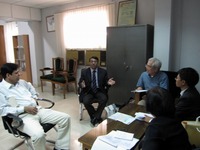 Another reviewer team composed of Dr. Taiichi Hayashi of Research Center for Fluvial and Coastal Disasters of Disaster Prevention Research Institute of Kyoto University, Mr. San Kung from Myanmar's Relief and Resettlement Department, Ministry of Social Welfare, Relief and Resettlement, Ms. Crispina B. Abat of Philippines' Office of Civil Defense, and Ms. Yumi Shiomi of ADRC visited Bangladesh on 12-16 December 2010 to conduct a survey for learning about their ongoing efforts for Cyclone Preparedness in the country. The survey began with visiting relevant organizations in Dhaka such as Disaster Management and Relief Division of Ministry of Food and Disaster Management (ADRC's counterpart in Bangladesh), its Disaster Management Bureau, Bangladesh Meteorological Department, Bangladesh Water Development Board, Institute of Water Modeling and Bangladesh Red Crescent Society. Then the team moved to cyclone-prone Noakhali District in the coastal region to learn the situations through interviewing local DRM officials, volunteers and residents, and visiting cyclone shelters and embankments. The team members with cyclone expertise and experiences of severe storm countermeasures in their countries actively shared opinions during the survey.
Another reviewer team composed of Dr. Taiichi Hayashi of Research Center for Fluvial and Coastal Disasters of Disaster Prevention Research Institute of Kyoto University, Mr. San Kung from Myanmar's Relief and Resettlement Department, Ministry of Social Welfare, Relief and Resettlement, Ms. Crispina B. Abat of Philippines' Office of Civil Defense, and Ms. Yumi Shiomi of ADRC visited Bangladesh on 12-16 December 2010 to conduct a survey for learning about their ongoing efforts for Cyclone Preparedness in the country. The survey began with visiting relevant organizations in Dhaka such as Disaster Management and Relief Division of Ministry of Food and Disaster Management (ADRC's counterpart in Bangladesh), its Disaster Management Bureau, Bangladesh Meteorological Department, Bangladesh Water Development Board, Institute of Water Modeling and Bangladesh Red Crescent Society. Then the team moved to cyclone-prone Noakhali District in the coastal region to learn the situations through interviewing local DRM officials, volunteers and residents, and visiting cyclone shelters and embankments. The team members with cyclone expertise and experiences of severe storm countermeasures in their countries actively shared opinions during the survey.
This project aims at developing the mutual learning process among the ADRC member countries instead of one-way learning. After the survey missions, reviewer teams will compile survey reports and send them to target countries and then to ADRC member countries to enhance cross-fertilization.
ADRC would like to express its sincerest gratitude to all of those who have made precious contribution to this project this year.
(2010/12/21 17:40)
6th October 2010 (Yangon, Myanmar)
ADRC has been implementing web-based GLIDE-associated disaster database development project in ASEAN countries since 2008 with the financial support by Japan ASEAN Integration Fund. The objective of this project is to facilitate all ASEAN countries to develop their own national disaster databases with GLIDE numbers incorporated by training the invited government officials in charge of disaster information in ASEAN countries at ADRC. In 2010 the training program is scheduled for Cambodia, Indonesia and Myanmar, ADRC held kick-off meeting with Relief and Resettlement Department Myanmar on 6th October and agreed to cooperate with the GLIDE-associated disaster database development project.(2010/10/7 11:30)
15-17 September 2010(Seattle, USA)
This program was jointly organized by Peace Winds America (NPO) and the City of Seattle, and was held from 15-17 October at the Seattle Office of Emergency Management. The program aimed to promote the sharing of experiences and ideas regarding natural disasters and emergency management between local government officials in the US and Japan.
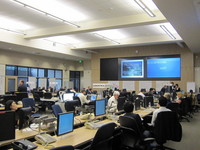 The Asian Disaster Reduction Center (ADRC), at the request of the organizers, provided help with the coordination of the participating organizations from Japan. Also, ADRC gave a presentation on "Government Coordination" in Japan and facilitated discussions throughout the program.
The Asian Disaster Reduction Center (ADRC), at the request of the organizers, provided help with the coordination of the participating organizations from Japan. Also, ADRC gave a presentation on "Government Coordination" in Japan and facilitated discussions throughout the program.
The participants included Japanese officials from the Ministry of Defense, Osaka Prefecture and the City of Osaka, Hyogo Prefecture and the City of Kobe, and Hiroshima Prefecture and the City of Hiroshima, as well as American representatives from the Federal Emergency Management Agency (FEMA), the City of Seattle, King County, the City of Honolulu, Microsoft, Boeing, and other organizations. The participants gave presentations on their own experiences and the outlook for the future from the viewpoint of those who are doing practical disaster management work on the ground. The Japanese participants were particularly impressed with the collaborative frameworks that have been developed in the US to enable local governments, private companies, and NGOs to work together.
This exchange program is expected to become an annual event and thus is expected to prove highly useful to both US and Japanese local governments long into the future.
(2010/09/18 13:10)
30 August-1 September 2010, Tokyo, Japan
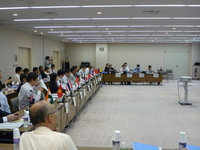
As a partner organization, ADRC participated in the ASEAN plus Three International Conference on Disaster Management in Tokyo.
ASEAN Plus Three International Conference on Disaster Management, hosted by the Ministry of Foreign Affairs of Japan in close cooperation with the Cabinet Office of Japan, United Nations International Strategy for Disaster Reduction (ISDR), Japan International Cooperation Agency (JICA) and Asian Disaster Reduction Center (ADRC), with participation of officials and academic experts from ASEAN countries Plus Three countries and observer countries such as Australia and India as well as other international organizations, was convened on 30 August-1 September 2010 in Tokyo, Japan.
The Meeting reviewed the progresses and challenges in the first half decade of the HFA 2005-2015 in the region and discussed to identify new challenges in the next half decade of the HFA with a view to contributing to the Mid-Term Review of the HFA. Participants of the Meeting shared the view that progresses have been made at both national and regional levels.
It was also pointed out that adaptation to climate change should be linked with disaster risk reduction policy in each country and facilitated through the regional cooperation in view of the disaster management.
The Meeting also acknowledged the important role of ADRC to the regional cooperation in Asia on disaster management and recognized valuable and significant activities of JICA in bilateral cooperation on disaster management through the Official Development Assistance of Japanese government.
-Note-
ASEAN Plus Three; ASEAN Member States (Brunei Darussalam, the Kingdom of Cambodia, the Republic of Indonesia, the Lao People's Democratic Republic, Malaysia, the Union of Myanmar, the Republic of the Philippines, the Republic of Singapore, the Kingdom of Thailand and the Socialist Republic of Vietnam) and People's Republic of China, Japan and Republic of Korea
1-2 July 2010, Bangkok, Thailand

The Technical Workshop to develop the Regional Roadmap for Promoting Regional Cooperation on Disaster Risk Reduction and Climate Change Adaptation was held in Bangkok, Thailand on 1-2 July to discuss and develop the regional roadmap for promoting regional cooperation on disaster risk reduction and climate change adaptation in Asia. The Workshop was organised jointly by UNSIDR, UNESCAP, NEMA of Korea and ADRC. This regional roadmap is planned to be one of the main outocomes of the 4th Asian Ministerial Conference on Disaster Risk Reduction (AMCDRR) to be held in Incheon, Korea, in October this year.
As many as around 50 experts from UN and other international organisations, Government Ministries/Agencies, and INGOs participated in the Workshop. From the ADRC, Mr. Atsushi KORESAWA and Mr. Huy Nguyen participated in the workshop. Also, ADRC facilitated the participation of experts from JICA, the Meteorological Research Institute of Japan's Meteorological Agency, and JAXA.
The experts discussed, inter alia: 1) the conceptual framework for promoting regional cooperation for disaster risk reduction and climate change adaptation in Asia: 2) the objectives of the regional road map, and: 3) the elements of the regional road map. Based on the result of two day discussion, UNISDR in cooperation with other partners will make a first draft of the roadmap which will be further examined at the upcoming IAP meeting in Incheon, Korea on 11-13 August.
The ADRC is expected to play a key role as one of lead agencies at the 4th AMCDRR, and therefore, will continue to take an active part in its preparatory process.
(2010/07/05 13:10)
ADRC participated in the ACDM Working Group Meeting on Risk Assessment, Monitoring and Early Warning
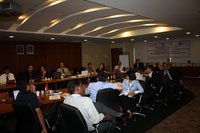
In the meeting, the participants including representatives from the ASEAN Secretariat, the ASEAN-US Technical Assistance and Training Facility, the United Nations Development Programme (UNDP), the Pacific Disaster Center (PDC), the Republic of Singapore, the Kingdom of Cambodia, the Republic of the Philippines, the Republic of Indonesia, the Socialist Republic of Vietnam discussed the framework for risk assessment, monitoring and early warning across the ASEAN countries.
The ADRC made a joint presentation with the UNDP and the PDC on the importance of Disaster Inventories for Disaster Risk Reduction. The ADRC will actively participate in the future meetings so that the advanced experience and know-how of Japan in this field can be transferred to the ASEAN countries.


